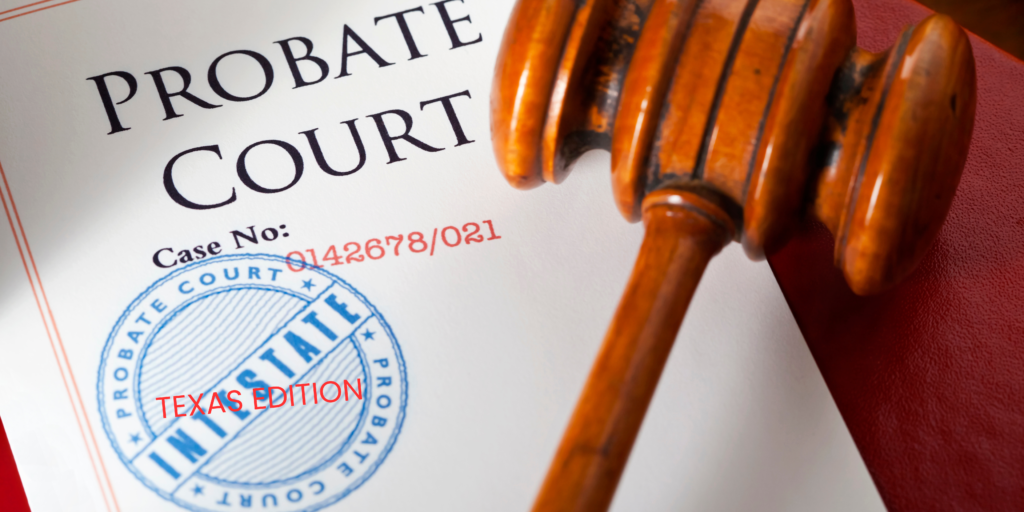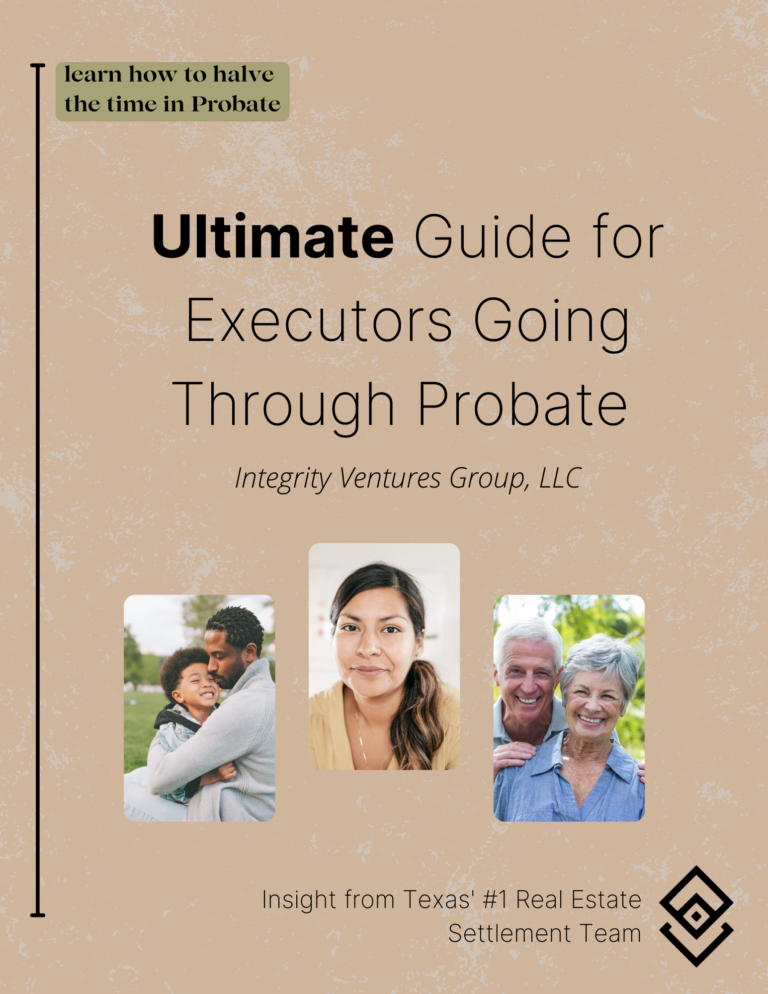do you want to cut your probate Process time in half?
Introduction to Texas Probate: Navigating the Legal Maze After Loss
disclaimer
Integrity Ventures Group asserts that it is not a licensed lawyer, and this article is intended solely for providing general guidance and information, and should not be considered as legal advice or a substitute for consulting with a qualified attorney. For any specific legal grievances related to personal probate cases, we strongly advise individuals to seek professional legal counsel and engage the services of a licensed attorney.
At Integrity Ventures Group, we pride ourselves on being the premier estate settlement firm in Texas. Our expertise lies in assisting families daily, helping them unravel the complexities of their probate proceedings alongside their attorneys. We would be honored to extend our knowledge to help guide you through your unique journey as well. Let’s Dive into: Introduction to Texas Probate: Navigating the Legal Maze After Loss.
Introduction:
The death of a loved one is an emotionally taxing experience. Alongside grieving, families must deal with legal formalities related to the deceased’s estate. In Texas, the process of probate takes center stage as the prescribed method of estate administration and settlement. Due to its intricate nature, navigating Texas probate law can be a daunting task. This guide aims to provide a more extended look into what probate is, how it works in Texas, and what steps families should take to ensure the smooth transition of assets.
What is Probate?
Probate is a legal framework that validates a deceased person’s will, helps settle debts, and ensures that assets are transferred to the designated beneficiaries. In the absence of a will, probate assists in the legal distribution of assets according to Texas state law. It is essentially a court-supervised procedure that legitimizes the transition of property after a person’s death.
Importance of a Will in Texas
In Texas, as in many states, a will is a fundamental document that simplifies the probate process. It allows a person, known as the testator, to dictate how their assets should be distributed and who should manage the estate upon their death. If a will exists, the court’s primary role becomes ensuring that the will is genuine and that the estate is managed according to the deceased’s wishes.
Testate vs. Intestate
If someone dies with a valid will, they are said to have died “testate.” Conversely, dying without a will is called dying “intestate.” In the latter case, Texas law provides a default plan to distribute assets, which may not align with what the deceased might have intended.
Starting the Probate Process in Texas
Probate generally commences when someone submits the deceased’s original will along with a ‘Petition for Probate’ to the probate court in the county where the deceased person lived. Once the petition is filed, the court schedules a hearing to formally recognize the death and appoint the executor named in the will.
No Will? What Happens Now?
If a person dies without a will, the court can still appoint an ‘administrator’ who performs duties similar to an executor, albeit with more restrictions and oversight from the court. This appointment usually goes to a surviving spouse or next of kin, but others may petition for the role as well.

Types of Probate Administration
Independent Administration
This type is the most straightforward form of probate administration. In an independent administration, the executor can carry out many responsibilities without having to obtain court approval for every move. It simplifies and speeds up the process. For independent administration to be an option, the will must explicitly allow for it, or all beneficiaries must consent to it.
Dependent Administration
If a will mandates dependent administration or if there’s no agreement among the beneficiaries for an independent administration, the estate must go through the more complex, time-consuming dependent administration. Here, every significant decision by the executor needs court approval, making the process slower and often more expensive.
Small Estates and Special Considerations
In Texas, small estates that are worth less than $75,000, not counting the value of a homestead and other exempt property, may qualify for a simpler, expedited probate process.
Community Property Laws
Texas is a community property state. This means that property acquired during the marriage belongs to both spouses equally. This can create complexity during probate, especially if there’s a prenuptial agreement or if one spouse has significant separate property.
Executor’s Responsibilities
Being an executor is a demanding role that comes with a plethora of responsibilities. These include:
- Notification: Informing beneficiaries and creditors about the death and the ensuing probate process.
- Inventory: Creating a detailed list of the deceased’s assets and liabilities.
- Valuation: Appraising the estate’s assets for their current market value.
- Asset Protection: Safeguarding the estate’s assets until they can be distributed or sold.
- Debt Settlement: Paying off the debts of the deceased, which may include funeral costs, taxes, and other outstanding bills.
- Asset Distribution: Allocating the remaining assets among the beneficiaries as per the will or state law.
- Court Filings and Tax Returns: Preparing and submitting necessary documents to the court and filing tax returns for the estate.
- Final Accounting: Providing a detailed account of how the estate’s assets have been managed and distributed.
Role of a Probate Lawyer
Given the intricate nature of probate, families often benefit from the counsel of an experienced probate lawyer. Legal support is particularly crucial when the estate is large, when disputes arise, or when the will’s legitimacy is questioned. Lawyers help clarify the nuances of Texas probate law, provide advice on court procedures, and ensure compliance with legal timelines.
Complex Cases and Disputes
Sometimes, probate cases aren’t straightforward and can involve disputes among beneficiaries or questions about the validity of the will. If someone contests the will, the court must resolve these issues before assets can be distributed, adding another layer of complexity and delay to the process.
Closing the Estate
Once all debts, taxes, and legal fees have been paid, and the remaining assets are distributed to the beneficiaries, the executor or administrator can petition the court to close the estate. Closing the estate signifies the end of the executor’s duties and responsibilities.
Conclusion
Probate in Texas is a multifaceted process with numerous rules, procedures, and responsibilities. While the process can be conducted without legal help in simpler cases, the complexities that often arise make it advisable to consult with an experienced probate attorney. Understanding Texas probate law not only helps in executing a will effectively but also prepares you to navigate unexpected challenges. Being informed is your first step toward ensuring that your loved one’s wishes are honored and their estate is managed responsibly.
FIND MORE HELPFUL ARTICLES LIKE THIS ONE
DOWNLOAD YOUR PROBATE CHECKLIST TODAY.
Become a part of the numerous executors who have already benefited from our free guide. Elevate your probate process with our complimentary probate checklist, designed to guide you step by step through the process of selling your real estate property today. Download it now and streamline your journey through probate.






